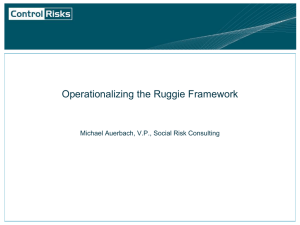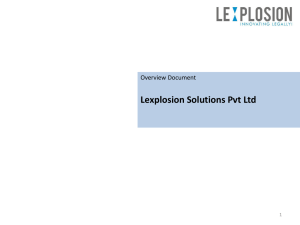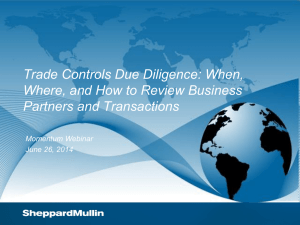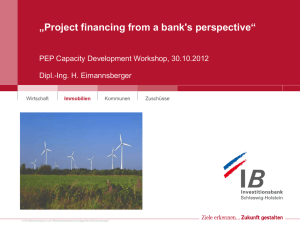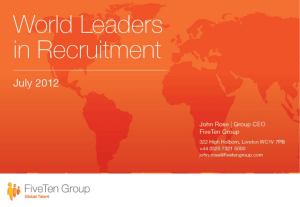HR DD
advertisement
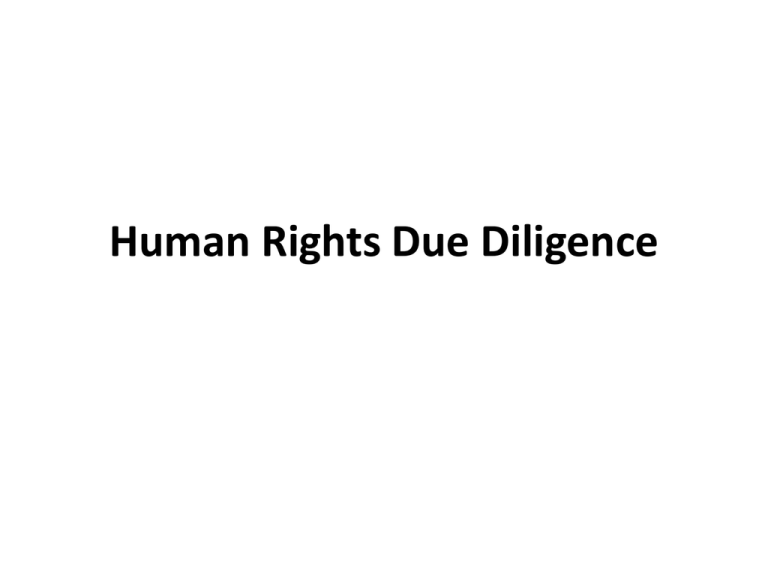
Human Rights Due Diligence Special Representative of the Secretary General (UN) (Prof. John Ruggie) (2005-2011) HR Due diligence (2008) Due diligence: a ‘concept [that] describes the steps a company must take to become aware of, prevent and address adverse human rights impacts.’ (2008) Key steps: • adopt human rights policies, • conduct impact assessments, • integrate human rights policies throughout the company’s departments, • track performance through monitoring and auditing HR Due diligence (2011) ‘A human rights due-diligence process to identify, prevent, mitigate and account for how they address their impacts on human rights’ (UNGPs 15b) ‘The process should include assessing actual and potential human rights impacts, integrating and acting upon the findings, tracking responses, and communicating how impacts are addressed.’ (UNGPs 17) ‘Business enterprises need to know and show that they respect human rights.’ (UNGPs 15 Comm.) DD: 2008 -> 2011 Elements of HR DD 2008 Policy (commitment to respect HR) x Impact assessment (identify & assess impacts) x x Integration (of policy/findings into company systems) x x Appropriate action (to address impacts) Tracking (of policy & actions taken) Reporting (communicating) 2011 x x x x DD as risk management Risks to whom? To business or to rightholders? ‘Human rights due diligence can be included within broader enterprise risk-management systems, provided that it goes beyond simply identifying and managing material risks to the company itself, to include risks to rights-holders.’ (GP17) ‘an enterprise’s human rights risks are the risks that its operations pose to human rights. This is separate from any risks that involvement in human rights impact may pose to the enterprise, although the two are increasingly related.’ (OHCHR Interpretive Guide) To prioritize or not? ‘Severe’ impacts Severity of impacts judged by •Scale (gravity of the impact), •Scope (number of individuals impacted) and •Irremediable character (any limits on the ability to restore those impacted to a situation at least the same as, or equivalent to, their situation before an adverse impact) (GP 14, Commentary) (OHCHR, An interpretive guide (2011)) GP24: ‘business enterprises should first seek to prevent and mitigate those [impacts] that are most severe’. To prioritize or not? ‘Salient’ human rights Most salient human rights: rights most at risk depending on sector and operating context. GPs clarify to ‘not focus exclusively on the most salient human rights issues and ignore others that might arise.’ (OHCHR Interpretive Guide) Conclusion: company should not prioritise its HR DD actions based on ‘salient HR’, but on the ‘severity’ of impacts. Due diligence – an on-going process On-going, not one-off process of assessing and acting on impacts ‘Should be ongoing, recognizing that the human rights risks may change over time as the business enterprise’s operations and operating context evolve.’ (UNGPs 17c) A defense of due diligence? ‘Conducting appropriate human rights due diligence should help business enterprises address the risk of legal claims against them by showing that they took every reasonable step to avoid involvement with an alleged human rights abuse. However, business enterprises conducting such due diligence should not assume that, by itself, this will automatically and fully absolve them from liability for causing or contributing to human rights abuses.’ (UNGPs 17 Comm) Difficult contexts (GP 23) • Clash between domestic laws & IHRL standards ‘Where the domestic context renders it impossible to meet this responsibility fully, business enterprises are expected to respect the principles of internationally recognized human rights to the greatest extent possible in the circumstances, and to be able to demonstrate their efforts in this regard.’ • Conflict zones and other areas where gross HR abuses are committed by other actors (like security forces) Risk for complicity in gross abuse -> take very seriously such situations (‘treat this risk as a legal compliance issue’), ensure to not exacerbate the situation, and consult externally with credible, independent experts on how best to respond to the situation. HR impact assessments (GP 18) ‘The purpose is to understand the specific impacts on specific people given a specific context of operations.’ • Based on IHRL ( rel. to env & soc IAs) • Vulnerable groups • Stakeholder participation (‘meaningful consultation’) • Prior to major transactions and periodically after Integration (GP19) Policy be ‘embedded into all relevant business functions’ ‘Effective integration requires that… Internal decision-making, budget allocations and oversight processes enable effective responses to such impacts.’ [identified through HRIAs] Tracking (the effectiveness of response) (GP20) Aim: to know if policy and actions taken work effectively • Ways of tracking: Reviews (surveys and audits) & grievance mechanisms • Impacts on the vulnerable/marginalized • Stakeholder consultation (feedback from external sources) - affected groups, experts, NGOs Reporting (GP 21) • HR DD as ‘know and show’ respect for HR • Forms of communicating: in-person meetings, online dialogues, consultation with affected stakeholders, and formal public reports (annual reports, CSR reports, on-line updates, and integrated financial and non-financial reports) • Severe HR impacts -> report formally (form, frequency, detail) • Verification: ‘Independent verification of human rights reporting can strengthen its content and credibility.’ • Reporting & accountability: ‘Showing involves communication, providing a measure of transparency and accountability to individuals or groups who may be impacted and to other relevant stakeholders, including investors.’ Ruggie’s comments on EC Directive on conflict minerals (2014) • formal reporting: under GP 19, ‘formal reporting’ for ‘severe impacts’, as in conflict situations. • Reporting mandated by law? ‘the legislative proposal before the Commission may view such reporting as merely optional. … a move to make reporting entirely optional risks leaving the most responsible companies exposed while those least attentive to their human rights responsibilities continue their current practices undeterred. It is surely through requiring the same reporting standards across companies that the Commission can help drive improvements where they are most needed and advance corporate respect for human rights in practice.’ http://business-humanrights.org/media/documents/ruggie-letter-barroso-eu-conflict-minerals-04-03-14.pdf UN Norms (2003) david weissbrodt.jpg David S. Weissbrodt - Minnesota Law School General provisions of implementation As an initial step towards implementing these Norms: • adopt, disseminate and implement internal rules of operation in compliance with the Norms, (-> GPs 16 and 19) • periodically report, (-> GP 21) • conduct periodic evaluations concerning the impact of their own activities on human rights, (-> GPs 18 & 20) • incorporate these Norms in their contracts or other arrangements and dealings with contractors, subcontractors, suppliers, licensees, distributors, or natural or other legal persons that enter into any agreement with the transnational corporation… (Art 15) TNCs ‘shall have the responsibility to use due diligence in ensuring that their activities do not contribute directly or indirectly to human rights abuses, and that they do not directly or indirectly benefit from abuses of which they were aware or ought to have been aware.’ (Commentary 1 (b)) Due Diligence in a broader context DD outside the UNGPs (1) DD in international law: State’s responsibility for actions of third parties • Alabama Arbitration case (1872): a neutral State is bound to ‘use due diligence to prevent the fitting out, arming, or equipping, within its jurisdiction, of any vessel which it has reasonable ground to believe is intended to cruise or to carry on war against a Power with which it is at peace …’ • Corfu Chanel case (ICJ, 1949): State not to allow its territory to be used for acts contrary to the rights of other States; obligation to prevent (or stop) those acts. DD in IHRL: State ‘obligation to protect’ HR • Velazquez case (I-ACtHR, 1988): ‘forced disappearance’ case. Illegal act of a private person triggers State liability because of ‘lack of due diligence to prevent the violation or to respond to it’. • Osman case (ECtHR, 1998) – no use of term ‘DD’, but detailed reasoning in a similar way. • UN Declaration on the Elimination of Violence against Women (1993). ‘Exercise due diligence to prevent, investigate and… punish acts of violence against women, whether those acts are perpetrated by the State or by private persons’ (art 4.c) DD outside the UNGPs (2) DD in EU law: defense if one acted with DD • Employer Sanctions Directive of 2009 (liability of employers for employing irregular non-EU workers). Contractor liable when subcontractors employ undocumented workers unless DD was exercised. (art 8c) DD in commercial law: defense if one acted with DD • US Federal Securities Act of 1933: issuer of securities & underwriters -> registration statement -> misstatements or omissions -> a DD defense for inadequate disclosure of material information to investors IF broker conducted a good faith investigation: "he had, after reasonable investigation, reasonable ground to believe and did believe" there were no misstatements or omissions of material facts. Transactional/commercial DD & HR DD State of Play (2012) http://www.ihrb.org/pdf/state-of-play/State-of-Play-Full-Report.pdf Regulatory strategies ref. DD Four main regulatory approaches • DD as compliance with law (direct legal obligation or defense against criminal/civil/administrative violations) • DD to obtain benefits/incentives (export credit, labeling schemes) • DD and transparency laws (disclose DD measures and harms. Securities laws, consumer protection laws, CSR reporting based on the logic that information will prompt action by consumers, investors, local communities and regulators.) • DD and a combination of previous approaches. Olivier De Schutter et al., Human Rights Due Diligence: the Role of States (International Corporate Accountability Roundtable 2012) 93 pages. Definition of Due diligence Legal definition (-> amount of effort expected) • ‘Due diligence has been defined as “such a measure of prudence, activity, or assiduity, as is properly to be expected from, and ordinarily exercised by, a reasonable and prudent [person] under the particular circumstances; not measured by any absolute standard, but depending on the relative facts of the special case”.’ (OHCHR Interpretive Guide) Definition in the UNGPs (-> systematic way of dealing with impacts) • ‘In the context of the Guiding Principles, human rights due diligence comprises an ongoing management process that a reasonable and prudent enterprise needs to undertake, in the light of its circumstances (including sector, operating context, size and similar factors) to meet its responsibility to respect human rights.’ (OHCHR Interpretive Guide) Conclusion: UNGPs silent about the amount of effort (that requires a caseby-case analysis), but very detailed about the management process and its key elements. Impact assessments • Environmental • Social (Chad-Cameroon pipeline; Baku-TbilisiCeyhan (BTC) pipeline) • Human rights First HRIA: BP’s Human Rights Impact Assessment of the Tangguh LNG Project (Indonesia) ‘Human Rights Compliance Assessment’ - Danish Institute for Human Rights Pulp Mills on the River Uruguay • ICJ litigation: Argentina v. Uruguay (decided April 20, 2010) • Environmental impact assessment is an international obligation of states (Court found no evidence that Uruguay failed to act with the requisite due diligence or that pollution from the pulp mill has had a harmful effect on the water quality) • The interesting part: o NOGs invoked the IFC Safeguard Policies and petitioned the IFC Compliance Advisor/Ombudsman -> improved environmental controls and monitoring of operational impacts o NGOs invoked the Equator Principles -> 1 lender pulled out
